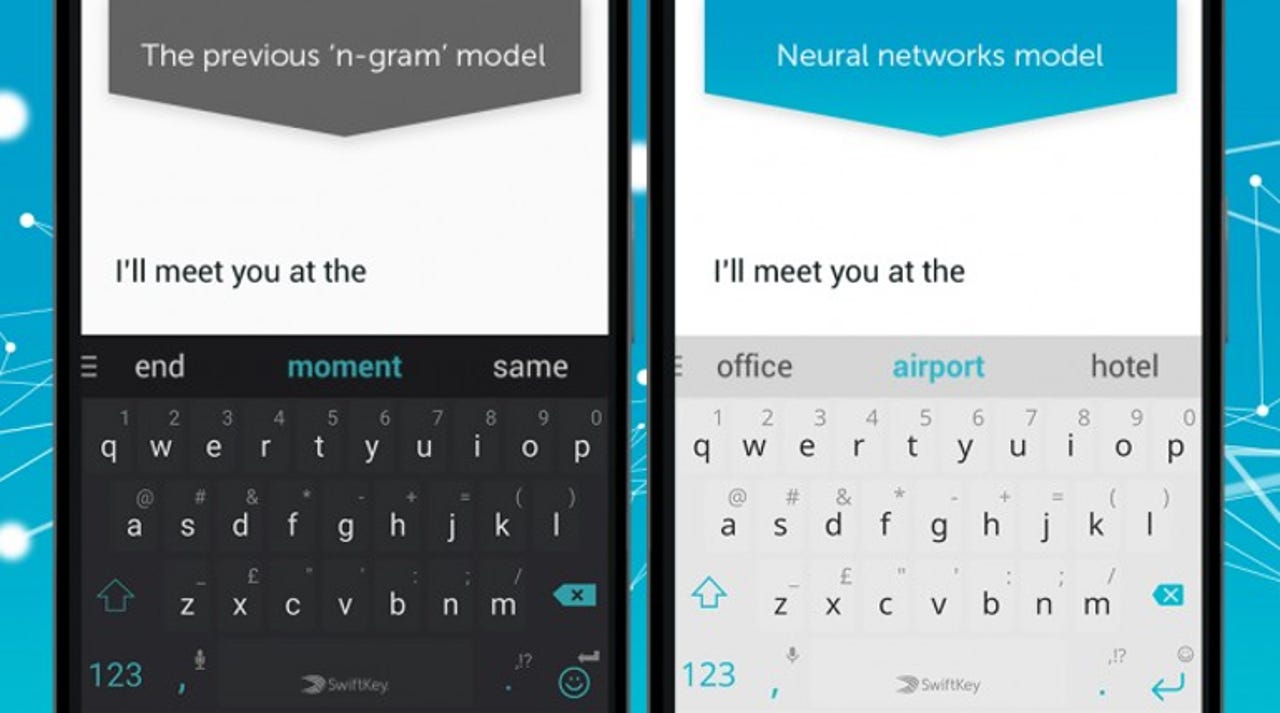Microsoft's SwiftKey adds AI: Now it's even smarter at knowing what you want to type


Having previously seen the phrase 'Let's meet at the airport', SwiftKey can now infer that 'office' or 'hotel' are similar words that could also be appropriate predictions in place of 'airport'.
Microsoft has released an overhauled version of its popular Android and iOS keyboard, SwiftKey, which packs a neural network into a smartphone.
Artificial intelligence, it seems, is suddenly everywhere, helping personal assistants from Google, Apple and Microsoft understand your speech and talk naturally, as well as organize your life's photos and translate your words into foreign languages.
With Microsoft's updated SwiftKey keyboard, the company says it becomes "the first instance of neural networks being used locally on a smartphone".
However, Google has also used a mini neural network its Google Translate app, which enabled text to be translated on the screen via the camera lens even without an internet connection.
Artificial neural networks are designed to mimic the human brain and are generally trained with masses of data to build up experiences that make them useful at handling specific tasks without relying on programmed instructions.
Google is investing heavily in the field, with recent examples including teaching robotic arms how to grab things, identifying where a photo was taken based purely on pixels, and teaching machines to talk more like humans.
Microsoft, which acquired SwiftKey in part for its work on AI, trained its neural-language model for typing on millions of sentences, so that it can do more than make predictions based only on previously-seen phrases.
With training complete and the model shrunken down for a smartphone, it can look deeper into each word's meaning and its context in a phrase to make a prediction.
"With this update SwiftKey is now able to meaningfully capture the relationship and similarity between words. For example, having previously seen the phrase 'Let's meet at the airport', the technology is able to infer that 'office' or 'hotel' are similar words that could also be appropriate predictions in place of 'airport'," SwiftKey explained in a blogpost.
Microsoft's updated app is available for Android phones now on Google Play, following nearly a year-long prototyping phase as the SwiftKey Neural Alpha for Android.
For now, the updated app only supports US and UK English, but more languages will be supported in future.
MORE ON AI AND SWIFTKEY
- LG investing in AI for smart appliances, autonomous driving
- Lumiata pilots AI to make health predictions for chronic conditions
- IBM to use AI to tame big data in its second African research lab
- IBM Watson: Here's what a movie trailer crafted by an AI looks like
- Google adds AI-powered insights stream into Analytics mobile app
- Microsoft's SwiftKey suspends sync after keyboard leaks strangers' contact details
- SwiftKey's next keyboard is built on neural network tech
- Microsoft wraps up SwiftKey purchase in move on Android, iOS
- TechRepublic: Elon Musk-backed OpenAI Project will get first 'deep learning supercomputer in a box'
- CNET: Facebook's AI tech now helps anyone build computers that can see